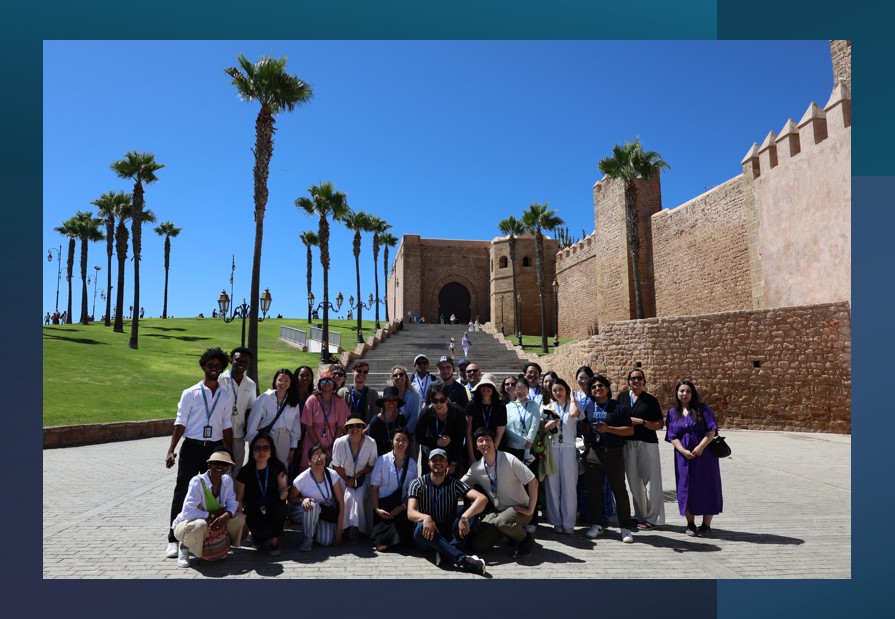Dr. Mary Mendenhall partnered with TC’s Office of Global Engagement and IES Abroad to offer a dynamic study abroad program for a cohort of 26 master’s and doctoral students from programs across the College. The course—Education, Refugee, and Migration Policies & Practices—was held in Morocco from July 11 to 21, 2025. Over the 10-day course, students engaged in an experiential itinerary that included class with Dr. Mendenhall, lectures/discussions with Moroccan faculty, and field-based learning through site visits across Rabat, Tangier, and Fez.
The program aimed to provide students with a deeper understanding of Morocco’s complex role in global migration flows. Positioned at a strategic geographic crossroads, Morocco functions both as a transit country and an increasingly prominent destination for migrants and refugees aiming to reach Europe. Through this immersive experience, students explored key themes such as European Union–Morocco migration relations, refugee and migrant education policy, lived experiences of displacement, and the governance structures surrounding migration.
Students gained direct exposure to the work of grassroots, governmental, and international organizations operating at the intersection of education and refugee services. Site visits included interactions with local organizations such as the Groupe Antiraciste de Défense et d’accompagnement des Etrangers et Migrants (Anti-Racist Group for the Support and Defense of Foreigners and Migrants) and international organizations such as the United Nations High Commissioner for Refugees (UNHCR) and Fondation Orient-Occident (FOO), enabling students to critically examine how education systems and support services respond to the needs of displaced populations in the region.
ICEP Student Reflections
Students in the International & Comparative Education Program (ICEP) who participated in the Morocco program shared their insights on what they found to be the most impactful learning experiences.
Site visit to 100% Mamans in Tangier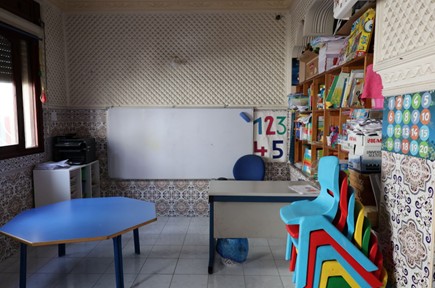
For Lingyi Zhou, a first-year MA student in ICEP, prior to participating in the Morocco study abroad course she viewed migrant education primarily through formal mechanisms—school access, curriculum adaptation, teacher training, and policy. However, her experience reshaped that understanding by revealing the profound fragility of those systems, especially in highly politicized and under-resourced migration contexts. Encounters with organizations like 100% Mamans highlighted the disconnect between policy and lived experience, showing that education is not just formal instruction but also safety, healing, and mutual care. While reflecting on the visit to 100% Mamans, Lingyi shared the following:
“The room was filled not only with physical exhaustion, but with a quiet resilience I would not forget. A staff member shared stories of women who had fled violence, arrived pregnant and alone, and were now trying to rebuild some kind of stability. Despite scarce resources and no legal clarity, they were helping one another, holding each other’s babies, showing up for each other. These were not social services; they were lifelines.
This visit made me rethink what counts as education. In places like 100% Mamans, education does include classrooms and structured lessons for the children. But what stood out to me was how learning is supported by everything that surrounds those classrooms. It begins with safety, emotional stability, and the chance to simply rest. Learning happens alongside healing. Before anything else, it is about recovering the ability to hope.”
The course illuminated how education for migrants must be flexible, deeply contextual, and rooted in human dignity, often taking place in non-formal spaces where care precedes curriculum. Ultimately, the experience transformed Lingyi’s perspective:
“This course challenged the limits of how I used to think about education in migration. It taught me that education is not just a tool for integration or protection; it is an act of resistance, a reclaiming of possibility.”
Site visit to FOO in Rabat
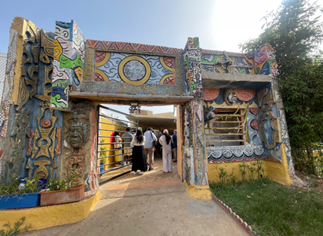
The visit to Fondation Orient-Occident (FOO) was a defining moment for Han Qing Chew, a second year in ICEP. This visit offered a powerful lens into the realities faced by migrants navigating Morocco’s restrictive migration landscape. Drawing on prior academic exposure—particularly Elsa Tyszler’s critique of anti-trafficking rhetoric as a cover for migration control (an assigned reading for class)—Han observed first-hand how local organizations like FOO offer vital, compassionate support where state systems fall short. The contrast between punitive policies and the human-centered work at FOO illuminated the disconnect between official narratives and lived migrant experiences. A particularly striking moment for Han came when a child at the center joyfully interacted with an IES Abroad guide. Recounting the visit to FOO, Han shared,
“The encounter showed me that beyond policy debates as well as political rhetoric, there are real lives that are dependent on accessible, supportive spaces. Spaces that both provide and offer protection, advocacy, and dignity are crucial amidst great adversity.”
This visit deepened Han’s awareness of how organizations like FOO fill critical gaps, offering not just services but lifelines amid systemic adversity.
International study programs, like the Morocco Study Abroad Program, play a transformative role in shaping global perspectives on refugee education and migration by bridging the gap between academic theory and lived reality. For Joe Kim, second-year EdM student, whose research primarily focuses on East Asia and the Middle East, the program expanded his regional lens and added vital complexity to his understanding of migration systems. For instance, Joe highlighted that,
“Site visits to organizations like Fondation Orient-Occident (FOO), Conseil de la Communauté Marocaine al’etranger (CCME), the Anti-Racist Group for the Support and Defense of Foreigners and Migrants (GADEM), the Nordic Center for Conflict Transformation, and 100% Mamans emphasized the need for holistic support. Across these organizations services include legal aid, psychosocial services, teacher well-being, and education advocacy to counter discrimination and protect vulnerable groups.”
Site visit to Conseil de la Communauté Marocaine al’etranger in Rabat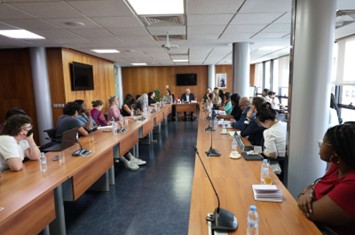
Engaging directly with UN agencies, local NGOs, and government institutions revealed how factors such as documentation status, language barriers, and economic hardship intersect to affect school enrollment and access. Joe’s experience also helped him further understand Morocco’s potential as a model for migration policy, given its unique position as a country of origin, transit, and destination. Ultimately for Joe, the program provided “depth and nuance that cannot be fully captured through academic study alone,” reinforcing the value of experiential learning in global education discourse.
Lastly, for Weijing Zhang, a first-year MA student in ICEP, this study abroad program in Morocco offered a multidimensional view of refugee and migrant education sharing that it,
“enabled me to explore the layered realities of refugee and migrant education—how policy, community, and individual agency intersect in both productive and challenging ways.”
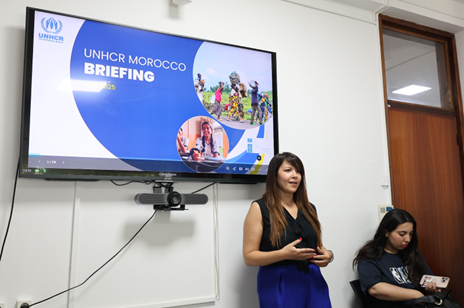
In Rabat, the United Nations High Commissioner for Refugees (UNHCR) staff shared national inclusion strategies, from large-scale data systems to informal education programs, demonstrating the potential of coordinated policy. Yet the persistence of administrative barriers, such as difficulties in securing official identification, highlighted gaps between frameworks and lived realities. Visits to Fondation Orient-Occident (FOO) and 100% Mamans showcased the transformative impact of community-led initiatives:
“Over mint tea at lunchtime, conversations ranged from caring for migrant workers’ children to the mothers’ career aspirations. I was moved by the volunteers’ dedication and by the sense of belonging they created for migrant families in that space.”
These encounters underscored that true inclusion requires more than policy—it demands the alignment of systemic commitments, school practices, and grassroots partnerships to ensure migrants are supported as active co-creators of their education.
For more info about study abroad opportunities, offered by ICEP faculty check out the following:
- Costa Rica program on Education, Conflict, and Peacebuilding, carried out in partnership with the United Nations University for Peace and led by Dr. Garnett Russell (January 2026).
- France Global Governance Institute, carried out in partnership with Sciences Po, UNESCO, and IES Abroad and led by Dr. Gita Steiner-Khamsi (Paris, Spring 2026). Students will delve into international policymaking in education and development.
- Morocco Education, Refugee, and Migration Policies & Practices program will most likely be offered again in Summer 2026 as well.
We encourage students to explore OGE’s study abroad page for more information and opportunities.
Written by Jazmin Guardado in collaboration with Lingyi Zhou, Han Qing Chew and Joe Kim (ICEP master’s students)
